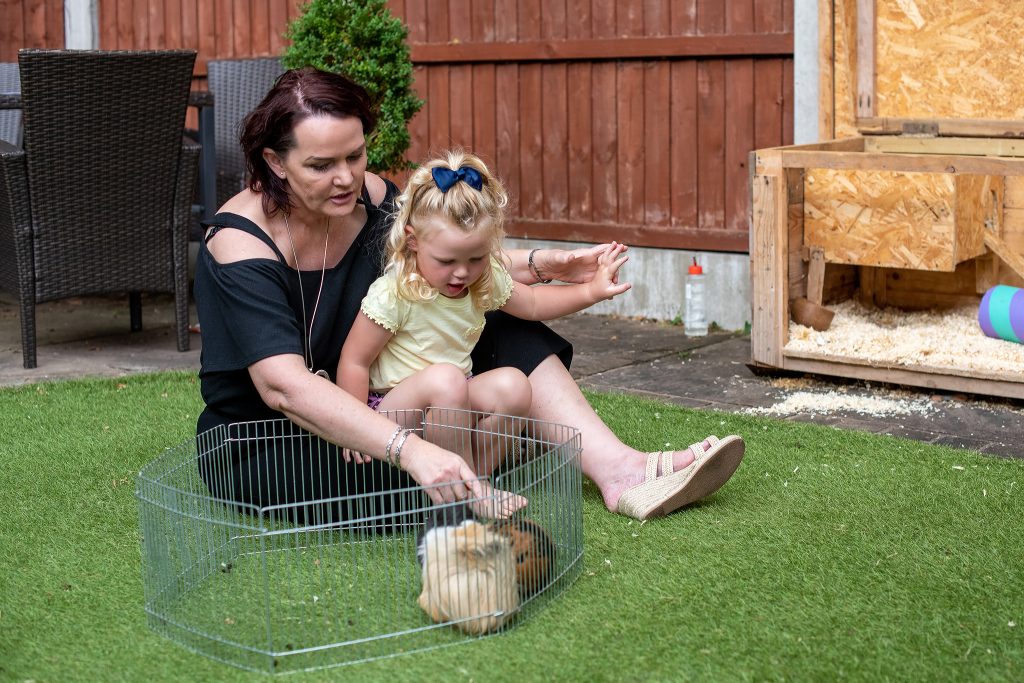“I’ve never worked anywhere where the needs or opinions of the staff have been so important. That helps to make my job so much easier,” says Rebecca Sutton, principal social worker for children’s services at Wigan Metropolitan Borough Council and service lead for workforce and quality assurance.
Caring senior leadership
Rebecca describes the support from senior leaders as “incredible”.

Sandie Hayes
“I think Sandie Hayes, practice director, and Colette Dutton, director of children’s services, have a lot do with that. They are always open to hearing the suggestions I put to them from social workers,” she says.
But the participation goes much further than just the immediate team, Rebecca explains. “We work closely with the council too. So, when I go to leadership meetings to share what staff are saying, not only are the practice director and the director there, but so are the chief executive, leaders of the council, and other colleagues across the directorate. They want to hear the views of staff, too.
The listening authority
This culture of encouraging staff feedback and implementing these recommendations is part of Wigan’s ‘You Said, We Did’ approach – aimed at improving workforce conditions. The approach has resulted in Wigan making positive day-to-day changes for social workers and enhancing the tools they need to deliver good social work.
The list of actions include minimising the amount of paperwork for panels and providing social workers with smart phones during the pandemic.
“Prior to the pandemic, we had mobile phones, but they were not smart phones,” says Shelby, a newly-qualified social worker. “Because visiting families became more challenging during the lockdown, we needed to be able to connect with families virtually. In a matter of a few weeks, social workers across the whole directorate received smart phones, which made speaking with our families easier and more efficient.”
I like that we are acknowledged for the good work that we do.
Clear communication
Access to specialised training has always been made willingly available, says Jill, a senior social worker.
“We have a legal hour where solicitors come and speak to us on topics related to our line of work. Even if the information is not specific to your role, there is an opportunity to pick up some valuable learning, connect with social workers and learn from each other.”
There are regular learning events called ‘quality learning sessions’, where information is shared, and practitioners have a valuable opportunity to contribute confidentially with the knowledge that what is shared is then discussed with senior managers.”
Wigan has also commissioned training aimed at increasing awareness of county lines, missing children and age assessment training. “This training has helped to enhance our knowledge of how to tackle complex safeguarding” says Jill.
Staff can even contribute directly to strategic planning as Rebecca chairs a workforce practitioner board. Staff from across the full directorate are able to read the minutes and reports from specific boards, and provide constructive criticism and ideas to senior leaders in order to influence strategic delivery.
Development resource

Rebecca Sutton
On the request of social workers, Wigan created a resource site called the Workforce Essentials on SharePoint (WES). The platform holds good practice examples, and information, guidance and examples in respect of all aspects of social work.
“If we find a good example through an audit, which can give staff a good resource to improve in a particular area of their work, we anonymise it and put it on the WES,” Rebecca says.
“So if a social worker was dealing with a private fostering case, for example, and had not done one before, they could access a templates through the WES and this helps to save time,” says Shelby.
Social work forums
It is thanks to the formation of Wigan’s social work forum, shortly before the pandemic kicked in, that social workers have been able to communicate their views more regularly to management. Pathways include a monthly staff briefing, a monthly newsletters and the six-weekly social work forums.
“In our September social work forum, we looked at all the recommendations social workers had put to us 12 months ago, looked at the progress we had made, and after establishing that we had dealt with all of them, asked them to identify new priorities,” says Rebecca.

Colette Dutton
“Colette came for the second half that session to hear what the staff wanted us to prioritise. For me, this was key because it meant that it wasn’t just me taking social workers’ comments back to senior leadership but senior leadership hearing directly from social workers about what they wanted.”
Among the suggestions was giving social workers a ‘lockdown day’ to allow them to complete their CPD without feeling pressurised to do that on top of their day-to-day duties. Wigan has since adopted the recommendation.
The future
Wigan is under no illusions that more is needed to improve children’s services. In Wigan’s last Ofsted inspection in October 2020, there was a need to lower caseloads and complete the implementation of the council’s chosen model of practice.
But when it comes to improving conditions for the workforce, Rebecca believes they are on the right path. According to Rebecca, the council saw 30% more new starters join and had 57% less leavers between January and September 2021 compared to the same time in 2020. The council has expanded its teams and created new roles to meet demands. The roles include a grade 10 role for experienced social workers that do not want to go into management.
“We want staff to want to stay and progress in Wigan,” says Rebecca. “The grade 10 role allows experienced social workers to continue working with children and families, but also take a mentoring role, to less experienced members of staff. Their expertise is recognised in their pay.”

Jill has worked at Wigan for over 20 years
“This senior social work role allows social workers to progress, without moving into a management position. It is not an advanced practitioner post, and so there are no supervisory responsibilities. However, the post acknowledges the expertise of experienced social workers who will hold a caseload while sharing their skills and knowledge with their less-experienced colleagues.”
For Jill, the senior social work role fits in with her career progression expectations. “I have been a social worker for nearly 20 years but had no desire to progress into a management role – something that I communicated during Wigan’s workforce group meeting.
“Wigan listened and took that information back to senior leadership and it is from there that I believe the role of a senior social worker was established. This role means managing more complex cases and allows me to work with children and families, which I love, while also supporting less experienced colleagues.”
What good looks like
Ensuring social workers access continued support is what Rebecca is keen to cultivate.
“I’ve been a frontline social worker, so I know what the challenges are, and I know what staff need to do good social work”, says Rebecca who officially started as principal social worker in June 2020. “It is the permission to work creatively. It’s about promoting a learning culture not a blame culture, and it’s about celebrating things that go well.”
“Wigan is strengthening the environment that staff work in so that they can accurately assess the needs of children and families in an asset-based manner. We work with them to come up with long-term plans that are realistic and sustainable. We also want them to draw on their community resources so that children can stay at home, if it is safe to do so, without our involvement.”
“My director and line manager always acknowledge the good piece of work that I do. It is that same culture of appreciation that celebrates the positives that we pass on to our social workers, so staff feel valued. We know our workforce is our greatest asset.”
For Emma, a newly qualified social worker, the culture of appreciation in Wigan and the space to ask for help without feeling like you are underperforming is what she loves about working there.
“My line manager helps me to create mini action plans that enable me to prioritise what needs to be done. I’ve built those positive relationships here and really love my job. For me, the biggest thing is the people I work with – they are like a family. I like that we are acknowledged for the good work that we do and that it is shared among the team and put in the team newsletter. Those little things mean a lot and make a big difference.”
Find out more about a career at Wigan Metropolitan Borough Council here and read more about the authority here.




 Facebook
Facebook X
X LinkedIn
LinkedIn Instagram
Instagram